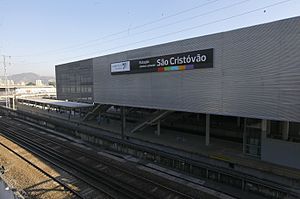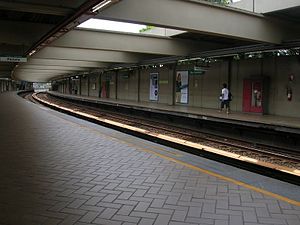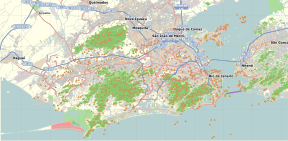São Cristóvão Station (Portuguese: Estação São Cristóvão) is a railway station in São Cristóvão, Rio de Janeiro which is serviced by the Rio de Janeiro Metro and SuperVia.[1]
São Cristóvão Estação São Cristóvão | ||||||||||||||||||||||||||||
|---|---|---|---|---|---|---|---|---|---|---|---|---|---|---|---|---|---|---|---|---|---|---|---|---|---|---|---|---|
 São Cristóvão Supervia station | ||||||||||||||||||||||||||||
| General information | ||||||||||||||||||||||||||||
| Location | Rio de Janeiro Brazil | |||||||||||||||||||||||||||
| Coordinates | 22°54′36″S 43°13′23″W / 22.9101004°S 43.2229996°W | |||||||||||||||||||||||||||
| Elevation | 4 metres | |||||||||||||||||||||||||||
| Owned by | Rio de Janeiro State Government | |||||||||||||||||||||||||||
| Operated by | SuperVia | |||||||||||||||||||||||||||
| Line(s) | Deodoro Line Santa Cruz Line Japeri Line Belford Roxo Line Saracuruna Line | |||||||||||||||||||||||||||
| Platforms | 3 island platforms | |||||||||||||||||||||||||||
| Tracks | 6 | |||||||||||||||||||||||||||
| Construction | ||||||||||||||||||||||||||||
| Bicycle facilities | Yes | |||||||||||||||||||||||||||
| Other information | ||||||||||||||||||||||||||||
| Station code | SCO | |||||||||||||||||||||||||||
| History | ||||||||||||||||||||||||||||
| Opened | 1859 | |||||||||||||||||||||||||||
| Rebuilt | 1937 2016 | |||||||||||||||||||||||||||
| Electrified | 1937 | |||||||||||||||||||||||||||
| Services | ||||||||||||||||||||||||||||
| ||||||||||||||||||||||||||||
| ||||||||||||||||||||||||||||
 São Cristóvão metro station | ||||||||||||
| General information | ||||||||||||
| Location | Rio de Janeiro Brazil | |||||||||||
| Coordinates | 22°54′35″S 43°13′16″W / 22.9097222°S 43.2211111°W | |||||||||||
| Owned by | Rio de Janeiro State Government | |||||||||||
| Operated by | Metrô Rio | |||||||||||
| Line(s) | Line 2 | |||||||||||
| Platforms | 2 side platforms | |||||||||||
| Tracks | 2 | |||||||||||
| Other information | ||||||||||||
| Station code | SCR | |||||||||||
| History | ||||||||||||
| Opened | 1981 | |||||||||||
| Passengers | ||||||||||||
| 2017 | 4.052 million | |||||||||||
| Services | ||||||||||||
| ||||||||||||
| ||||||||||||
Supervia station
editHistory
editSão Cristóvão Station was opened on 16 July 1859, being part of the first section of the Central do Brasil Railroad, between Rio de Janeiro and Nova Iguaçu.[2] With the growth of the city of Rio de Janeiro, passenger trains started to run with ever increasing frequency, and suburban trains started running in the 1920s. During the electrification works of the Central do Brasil railroad (1934–1937), São Cristóvão Station was reconstructed, with a mezzanine over the tracks.
With the expansion of services on the railroad between 1963 and 1972, new platforms were built, and the mezzanine over the station was expanded.[3][4] Despite this, the station could not keep up with the number of passengers. On 12 October 1974, during the Children's Day festivities in the Quinta da Boa Vista, severe overcrowding inside the station caused 4 deaths and hundreds of injuries.[5]
With the construction of São Cristóvão Metro Station between 1976 and 1981, plans were made to remodel and integrate the suburban rail station to the metro, though they never left the drawing board. In 1984, São Cristóvão Station was transferred from the Federal Railroad Network to the Brazilian Urban Train Company (CBTU), which made new plans to remodel the station, but those plans also never left the drawing board due to a lack of funds.[6][7]
After the privatization of urban trains in Greater Rio de Janeiro and of the station in 1998, a new plan for the station was presented in 2000 through a national architecture competition. Despite the winning entry being created by Mario Biselli and José Paulo de Bem (who designed Sé Station in São Paulo), the plan was never acted on due to a lack of funds.[8][9] Only in the 2010s would Supervia and the Rio de Janeiro State government start a new reconstruction project. Financed by the Brazilian Development Bank, the plan was commissioned with the aid of private companies including Planorcon, LZD Arquitetos and RVBA Arquitetos, but the reconstruction itself would be done by EBTE Engenharia, and was completed on 27 July 2016.[10][11][12][13]
Platforms
edit| Southbound local | ← Deodoro Line towards Central do Brasil (Praça da Bandeira) (weekday mornings and early afternoons)[14] ← Santa Cruz Line towards Central do Brasil (Praça da Bandeira) (weekends and weekday afternoons and evenings) ← Japeri Line towards Central do Brasil (Praça da Bandeira) (weekends and weekday afternoons and evenings) |
| Island platform | |
| Northbound local | Deodoro Line towards Deodoro (Maracanã) (weekdays, except nights) → Santa Cruz Line towards Santa Cruz (Maracanã) (weekends and weekday early mornings and nights) → Japeri Line towards Japeri (Maracanã) (weekends and weekday early mornings and late nights) → |
| Southbound express | ← Santa Cruz Line towards Central do Brasil (Central do Brasil) (weekday mornings and early afternoons) ← Japeri Line towards Central do Brasil (Central do Brasil) (weekday mornings and early afternoons) |
| Island platform | |
| Northbound express | Santa Cruz Line towards Santa Cruz (Maracanã) (weekdays, except early mornings and nights) → Japeri Line towards Japeri (Maracanã) (weekdays, except mornings and late nights) → |
| Southbound | ← Belford Roxo Line towards Central do Brasil (Central do Brasil) ← Saracuruna Line towards Central do Brasil (Central do Brasil) |
| Island platform | |
| Northbound | Belford Roxo Line towards Belford Roxo (Maracanã) → Saracuruna Line towards Gramacho (weekdays) or Saracuruna (weekends) (Maracanã) → |
Metro Station
editHistory
editThe first plans for São Cristóvão Metro Station were presented (along with the plans for Triagem, Maracanã and Maria da Graça Metro Stations) in June 1976 by Projeto Arquitetos Associados Ltda. (PAAL), a private company owned by Sabino Machado Barroso, Jaime Zettel and José de Anchieta Leal, and said plans called for a direct integration to the existing train station.[15]
The construction of São Cristóvão Metro Station was contracted out by the Rio de Janeiro state government to Cetenco Engenharia S.A. and Ecisa - Engenharia, Comercio e Industria S/A for the value of 510 million cruzeiros and started on 16 March 1977. Despite the initial deadline of 600 days after the start of construction, São Cristóvão Metro Station was only inaugurated on 19 November 1981.[16][17][18]
Entrances
editThe station had three entrances in the past: Radial Oeste and RFFSA in the northern end and Senador Furtado in the southern end, but now it has four entrances: Praça da Bandeira, Radial Oeste Avenue, Maracanã Station and the Quinta da Boa Vista.
References
edit- ^ "São Cristóvão - Sobre a Estação". MetrôRio. Retrieved 15 September 2014.
- ^ Guia Geral das Estradas de Ferro (1960). "EFCB - Estrada de Ferro Central do Brasil-Linha do Centro (Bitola de 1,60 m)" [EFCB - Central do Brasil Railroad-Centre Line (1600 mm gauge)]. Centro Oeste. Retrieved 9 June 2019.
- ^ Rede Ferroviária Federal S/A (1963). "Comissão de remodelação e unificação dos transportes suburbanos da cidade do Rio de Janeiro" [Commission for remodelling and unification of suburban transport in the city of Rio de Janeiro]. Memória Estatística do Brasil-Biblioteca do Ministério da Fazenda no Rio de Janeiro. Retrieved 9 June 2019.
- ^ Rede Ferroviária Federal S/A (1971). "Área da Engenharia - Linhas 5 e 6 da Central" [Area of Engineering - Lines 5 and 6 of the Central Railroad]. Memória Estatística do Brasil-Biblioteca do Ministério da Fazenda no Rio de Janeiro. Retrieved 9 June 2019.
- ^ "Excesso de gente na festa da criança deixa 4 mortos" [Excess of people in children's day party leaves 4 dead]. Jornal do Brasil, Ano LXXXIV, edição 189, Seção Cidade, página 5. 14 October 1974. Retrieved 9 June 2019.
- ^ "Metrô modifica esquema da Central e trens vão ter terminal em Barão de Mauá" [Metro changes operation of the Central Railroad and trains will terminate in Barão de Mauá Station]. Jornal do Brasil, Ano LXXXVI, edição 345, Seção Cidade, página 15. 24 March 1977. Retrieved 9 June 2019.
- ^ "Estação terá um terminal de subúrbio" [Station will be suburban termius]. Jornal do Brasil, Ano LXXXVII, edição 66, Seção Cidade, página 18. 13 June 1977. Retrieved 9 June 2019.
- ^ "Nova estação da supervia em São Cristóvão" [New Supervia Station in São Cristóvão]. Vitruvius. July 2001. Retrieved 9 June 2019.
- ^ "SUPERVIA - ESTAÇÃO SÃO CRISTOVÃO". Biselli Katchborian Arquitetos Associados. 2000. Retrieved 9 June 2019.
- ^ "Estação São Cristóvão". LZD Arquitetos. 2014. Retrieved 9 June 2019.
- ^ "SUPERVIA DE SÃO CRISTÓVÃO". Galeria da Arquitetura. Retrieved 9 June 2019.
- ^ SuperVia (27 July 2016). "SuperVia entrega estação São Cristóvão totalmente reformada, a última estação olímpica do sistema ferroviário a ser reinaugurada" [Supervia inaugurates the totally reformed São Cristóvão station, the last Olympic station of the railway system to be rebuilt]. ANPTrilhos. Retrieved 9 June 2019.
- ^ "BNDES aprova R$ 1,6 bilhão para melhoria do transporte ferroviário urbano no Estado do Rio" [Brazilian Development Bank approves R$1.6 billion investment for urban railroad transport improvements in the State of Rio de Janeiro]. BNDES. 23 July 2013. Retrieved 9 June 2019.
- ^ "Mais viagens expressas no ramal Santa Cruz e retorno das viagens paradoras do ramal Deodoro" [More express services on the Santa Cruz Line and the return of local services on the Deodoro Line]. Supervia (in Portuguese). 5 July 2024. Retrieved 4 August 2024.
- ^ "Linha 2 do Metrô só espera edital para começar obras" [Line 2 of the Metro just waits for official notice to start construction]. Jornal do Brasil, Ano LXXXVI, edição 83, Seção Cidade, página 12/republished by Biblioteca Nacional-Hemeroteca Digital Brasileira. 30 June 1976. Retrieved 9 June 2019.
- ^ "Governador visita metrô e pede compreensão do povo por obras" [Governor visits metro and asks for understanding from the people about the delayed construction]. Jornal do Brasil, Ano LXXXVI, edição 337, Seção Cidade, página 12/republished by Biblioteca Nacional-Hemeroteca Digital Brasileira. 16 March 1977. Retrieved 9 June 2019.
- ^ "Estação São Cristóvão". Cetenco Engenharia S.A. 1981. Retrieved 9 June 2019.
- ^ "Metropolitano agrada mas faltam sanitários" [Metropolitan pleases, but lacks toilets]. Luta Democrática, Ano XXVI, edição 8184, página 3/republished by Biblioteca Nacional-Hemeroteca Digital Brasileira. 30 November 1981. Retrieved 9 June 2019.
